It’s not a bubble, because AI is already running the markets
3 min read
Opinion by: Saad Naja, Founder and CEO at PiP World
While the world debates whether AI is the next dot-com
Some cut risk instantly. Others waited for confirmation. A few leaned into the drawdown. What’s striking is not just the gains, it’s the composure. Each AI agent made its own independent decisions, yet collectively, they converged on profitable outcomes. That’s the essence of agentic intelligence, autonomous systems learning to interpret chaos as opportunity.
The rise of self-learning markets
Companies describe similar behavior within trading desks, where agentic systems parse live data from public disclosures and feed execution layers in real-time. Over time, agents evolve from code to cognition. Autonomous systems that read markets, understand intent and execute strategies on their own. Acting like a digital hive mind, adjusting logic mid-session as markets shift around them.
For years, quant funds and high-frequency traders have pitted humans plus algorithms against the market. Enter AI versus AI. Self-directed systems plan, reason and execute around the clock. What’s emerging is a battlefield of AIs — institutional, retail, and synthetic — talking to each other in real-time.
When AI trades with AI, human intent disappears. Prices move on machine-to-machine negotiations, not emotion or fundamentals. The market begins to trade itself.
Related: AI gives retail investors a way out of the diversification trap
A majority of global trading volume now runs through algorithmic systems, estimates ranging from 60% to 89%, depending on the market. Within months, Symphony’s agentic trading layer was clearing $140 million in transactions, working with 15 of the world’s biggest financial institutions to test self-learning yield and execution agents.
Everyday investors can finally compete
For decades, investing was about finding an edge. AI gives retail investors that power for the first time. Retail traders can soon deploy the same logic once reserved for billion-dollar funds. Swarm intelligence that scans arbitrage, simulates momentum, hedges risk and executes collaboratively. It’s the retail equivalent of a hedge fund in your pocket.
The walls between institutional and retail finance are eroding. AI makes the 1%’s playbook accessible to the 99%. The next outperformers will deploy agentic swarms, rather than tracking indexes.
When markets trade themselves
AI versus AI warfare will define liquidity, volatility and price discovery. Humans will still set direction, risk tolerance and capital allocation, but won’t press the buttons. Markets will begin to self-trade in swarms of autonomous participants. Power will shift to whomever fine-tunes the feedback loops. When agents detect each other’s footprints, they’ll evolve meta-strategies, sometimes to cooperate, sometimes to manipulate one another.
Trading floors are going quiet. The next generation of traders won’t shout orders; they’ll train AI agents. The winners won’t just be institutions, they’ll be retail traders who fine-tune their swarms alongside human judgment. We’re entering the agentic arms race.
Markets of tomorrow won’t sleep or panic. Agentic AI will learn, evolve, compete and occasionally conspire at breakneck speed.
While institutions continue to build layers of agents, retail investors face a choice. Follow the herd into AI stocks, or start training their own AI as their wing(wo)man. They won’t have an AlphaGo moment.
Quiet, relentless outperformance hides in the charts, open to anyone brave enough to seize their AI agent.
Opinion by: Saad Naja, Founder and CEO at PiP World.
This article is for general information purposes and is not intended to be and should not be taken as legal or investment advice. The views, thoughts, and opinions expressed here are the author’s alone and do not necessarily reflect or represent the views and opinions of Cointelegraph.






